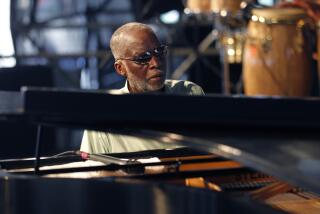Darius Brubeck Finds Home in Africa
- Share via
Does American jazz have its roots in Africa--or does contemporary African jazz find its inspiration in America?
Darius Brubeck, who started a jazz department at the University of Natal in Durban, South Africa, almost a decade ago, believes the answer to both questions is yes .
Brubeck--who is pianist Dave Brubeck’s oldest son and is named for classical composer Darius Milhaud, with whom his father studied--is a talented pianist-composer who first went to Africa in 1976 while performing on a tour with his father.
“It was just before the cultural boycott of South Africa was called (that) my father did a tour there,” recalls the younger Brubeck, 44.
Brubeck later married Cathy Morphet, a New York resident who was from South Africa and had assisted his father as a liaison on the South African tour. During a return trip in 1982 to visit his wife’s family, Brubeck looked up a professor named Chris Ballantine, whom he had met in New York. Ballantine headed the music department at the University of Natal.
That courtesy call proved a turning point in Brubeck’s life.
“This is fortuitous,” Brubeck recalls Ballantine saying when they got together. The university council had just given the professor permission to start a jazz course, provided he could find someone qualified to run it. He asked Brubeck to consider the post.
While being shown around the campus, Brubeck realized that the university had a strong integrationist and affirmative action policy. He applied for the position and was hired several months later.
“There was no formal jazz education at all in South Africa, even though they had turned out some major talents like pianists Abdullah Ibrahim (formerly known as Dollar Brand) and Chris McGregor,” he says. “It was obviously a strong jazz culture, and it seemed like another injustice that it hadn’t been recognized as an art form.”
Brubeck and his wife settled into a house in Durban in January, 1983, and soon thereafter got a solid turnout for his first classes.
But Brubeck found out that, as elsewhere in South Africa, blacks were shortchanged at the university: The nation spends on black education less than one-quarter what it spends on white education. “The only way blacks can afford to be there is on scholarships,” he says. “So Cathy and I have had to spend a lot of time raising funds for the students.”
And what about the questions of jazz’s roots?
“The conventional wisdom is a little off-base,” he says, referring to the long-held notion that jazz is of African origin. “If you were to look for anything resembling jazz throughout the African continent that didn’t have at least some kind of secondhand American context, you couldn’t come up with that.”
Still, there’s a singularity about South Africa and its music that thrills Brubeck.
“South African jazz really does have authentic roots that are reflected in the playing, the compositions and the style of these musicians. South Africans . . . haven’t had to become spiritually American to play jazz; they are still spiritually African.”
During a recent visit to the Jazz Educators’ Convention in Miami, the Brubeck group comprised Darius and brother Danny Brubeck on keyboards and drums; Chris Merz, a saxophonist who works as Darius’ teaching assistant, and four students: Fezile Faku on trumpet; Lex Futshane, acoustic and electric bass; S’Thembiso Ntuli, tenor sax, and Sazi Dlamini, guitar.
The points that Darius Brubeck makes were richly borne out: This music transcends the categories of African or American. As South Africa moves irrevocably toward integration, the contributions of these young Africans--all in their 20s--will be more and more fully absorbed into the mainstream of world music culture.
More to Read
The biggest entertainment stories
Get our big stories about Hollywood, film, television, music, arts, culture and more right in your inbox as soon as they publish.
You may occasionally receive promotional content from the Los Angeles Times.










